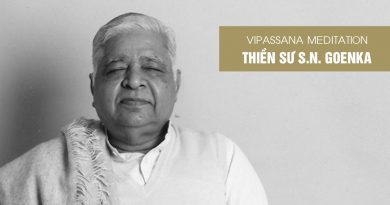Faqs On Vipassana Meditation – Vipassana Research Institute
MAIN CONTENT
- 1. Please briefly explain what is Vipassana?
- 2. What is it that you are actually teaching? What is the goal of your teaching?
- 3. Vipassana a religion?
- 4. Do I have to be a Buddhist to practice Vipassana?
- 5. You keep referring to the Buddha. Are you teaching Buddhism?
- 6. Why is the course ten days long?
- 7. Why do I have to stay for the entire ten days?
- 8. How about the tenth day, when talking is allowed and serious meditation stops? Can I leave then?
- 9. Vipassana requires a ten-day residential course. But is it possible to learn Vipassana on one;s own? Suppose one lives where there is no access to a Vipassana teacher?
- 10. What would you say to the busy professional or businessman who says that he or she can;t find 10 days to do a Vipassana course?
- 11. Many people come to something like Vipassana because they feel they are suffering in some way. But what about the person who doesn’t feel he or she is suffering, who feels quite happy and satisfied? What motivation would they have to do this work?
- 12. Let’s turn back to the supra-mundane. What does the science of Vipassana teach about the supernatural or the paranormal?
- 13. What is the ultimate goal of life? That is, what does all this harmony lead to?
- 14. Why is a course conducted in silence?
- 15. How can I be sure I am capable of doing the meditation?
- 16. Is there anyone who should not participate in a course?
- 17. Isn’t it selfish to forget about the world, and just to sit and meditate all day?
- 18. How much does the course cost?
- 19. How much are teachers paid to conduct courses?
- 20. Why are there no fees charged for doing a Vipassana course?
- 21. How are expenses met for a Vipassana course, since no fee is charged from students?
- 22. I can’t sit cross legged. Can I meditate?
- 23. I’m on a special diet. Can I bring my own food?
- 24. Can pregnant women attend courses? Are there any special arrangements or instructions for them?
- 25. Can Vipassana cure physical or mental diseases?
- 26. How about depression? Does Vipassana cure that?
- 27. Can Vipassana make people mentally unbalanced?
- 28. Can we get complete happiness and complete transformation through Vipassana?
- 29. Is it possible to fail at Vipassana?
- 30. In India there are many types of religious practices, social customs and caste. In these conditions how can Vipassana be helpful?
- 31. It is believed that Vipassana is very serious and suitable only for monks
- 32. Is Buddha;s teaching universal and can it be practised by anyone?
1. Please briefly explain what is Vipassana?
Mr. S. N. Goenka:Vipassana is an objective observation of the functioning of the mind-body phenomenon from moment to moment. It is & Yathābhūta jñāna darśanam; i.e. wisdom of realisation of the truth as it is. Vipassana Meditation is a technique to observe the reality about oneself objectively, at the experiential level; to observe it “AS IT IS”, not just as it appears to be.
2. What is it that you are actually teaching? What is the goal of your teaching?
Mr. S. N. Goenka: I am teaching a way of life, a code of conduct, an art of living. The goal is to learn how to live peacefully and harmoniously, how to live in morality, how to live with control over the mind, and how to live with the spirit of the mind full of good qualities like love, compassion, goodwill.
3. Vipassana a religion?
Mr. S. N. Goenka:No. There is no cult or sect or religion involved in Vipassana. For example, people used to be under the impression that the world was flat. And Galileo said, No, it is round and it rotates on its own axis. This was so even before Galileo; it was so at the time of Galileo; it was so afterwards. People simply started accepting it: Yes, it’s true, it;s round, it;s rotating. They didn;t get converted to Galileoism, they didn;t become Galileoists. Similarly, there is a law of gravity in nature. Newton discovered it. That doesn;t mean he created a law; the law was always there. The law of relativity was there too; Einstein discovered it.
In the same way in Vipassana, there is no conversion to any religion or any sectarianism involved. An enlightened person discovers this law, that when we generate negativity nature punishes us. Everyone wants to be free of this misery, and look, nature has also given us a way. We can observe it. We can observe the mind and matter reactions going on inside, and we will find we are coming out of it. This is the truth, which was always there. This universal truth can be experienced by one and all, all can benefit from it. A Christian will continue to remain a Christian his whole life, a Hindu a Hindu, a Muslim a Muslim, Jew a Jew. But they will start living a better life.
This is all Vipassana wants. This is what attracted me to Vipassana. I came from a totally different tradition, but when I passed through one Vipassana course I found it is so scientific, so rational, so non-sectarian, universal, and so result-oriented. It gives results here and now: what more could anybody want? Nobody told me to become a Buddhist. My teacher said, if you are a Hindu you remain a Hindu. I don;t care.
Doing Vipassana is like doing physical exercises to keep your body healthy. Here is a mental exercise to keep the mind healthy, which is much more important. The body may be very healthy, and yet if your mind is not healthy, you can;t keep your body healthy. It will become unhealthy.
So to me this mental exercise is so scientific, so non-sectarian, so rational, so universal, that everyone should take advantage of it. It is not a foreign cult which is being imposed on a particular community, nothing like that. People are afraid, I understand, because many gurus have come from India and tried to exploit the people in different ways, financially and socially. People are afraid when they see, Oh, another meditation teacher has come. Well, he may talk very fine, but ultimately he will try to exploit us and make us his slaves or this or that, or we may lose our own religion and get converted. That fear is natural, I can understand.
4. Do I have to be a Buddhist to practice Vipassana?
Mr. S. N. Goenka: People from many religions and no religion have found the meditation course helpful and beneficial. Vipassana is an art of living, a way of life. While it is the essence of what the Buddha taught, it is not a religion; rather, it is the cultivation of human values leading to a life which is good for oneself and good for others.
5. You keep referring to the Buddha. Are you teaching Buddhism?
Mr. S. N. Goenka: I am not concerned with isms. I teach Dhamma, and that is what the Buddha taught. He never taught any, or any sectarian doctrine. He taught something from which people of every background, every religion, can benefits. He taught the way with which one can to live a life full of benefits for oneself and other. He didn;t merely give empty sermons saying, Oh, People. You must live like this, you must live like that. The Buddha taught practical Dhamma, the actual way to live a wholesome life. And Vipassana is the practical know-how to lead a life of real happiness.
6. Why is the course ten days long?
Mr. S. N. Goenka: Actually, the ten-day course is the minimum; it provides an essential introduction and foundation to the technique. To develop in the practice is a lifetime job. Experience over generations has shown that if Vipassana is taught in periods of less than ten days, the student does not get a sufficient experiential grasp of the technique. Traditionally, Vipassana was taught in retreats lasting seven weeks. With the dawning of the 20th century, the teachers of this tradition began to experiment with shorter times to suit the quickening pace of life. They tried thirty days, two weeks, ten days, down to seven days–and they found that less than ten days is not enough time for the mind to settle down and work deeply with the mind-body phenomenon.
7. Why do I have to stay for the entire ten days?
Mr. S. N. Goenka: Vipassana is taught step by step, with a new step added each day to the end of the course. If you leave early, you do not learn the full teaching and do not give the technique a chance to work for you. Also, by meditating intensively, a course participant initiates a process that reaches fulfillment with the completion of the course. Interrupting the process before completion is not advisable.
8. How about the tenth day, when talking is allowed and serious meditation stops? Can I leave then?
Mr. S. N. Goenka: The tenth day is a very important transition back to ordinary life. No one is permitted to leave on that day.
9. Vipassana requires a ten-day residential course. But is it possible to learn Vipassana on one;s own? Suppose one lives where there is no access to a Vipassana teacher?
Mr. S. N. Goenka: I would very much like it if people could just listen to a few words about the technique, which is so simple. In about ten minutes I can explain what the technique is, and people can understand. They can tell you what they understand. But we have tried this and it doesn;t work. Because from birth, when we first opened our eyes and started looking outside, we have been giving all importance to things out-side. Our whole life we have been extroverted. Now all of a sudden we want to change that habit and experience things inside. Just saying that doesn;t work. We have to practice. One wishing to practice must be under a proper guide, who has himself practiced properly, and who can guide properly. And must be in an environment where there is least disturbance. You can;t learn it in the normal marketplace & environment with all the disturbances. Once you have learned then, yes, you go to live in the world outside, with all its distractions, and yet you can practice. But for learning the first time, the proper environment is essential. I know it is so difficult for somebody to find ten days of life free, to leave all one;s other responsibilities and come to learn this technique. But it is essential.
10. What would you say to the busy professional or businessman who says that he or she can;t find 10 days to do a Vipassana course?
Mr. S. N. Goenka: The same thing happened to me—I was such a busy businessman, an industrialist. For me to give ten days was unthinkable. I was a very angry person, a very egoistic person, living an ego-centered life, hating others and feeling that I am the wisest and most intelligent person, because at this young age I have so much money. All the others are useless, that’s why they can’t earn money, they can’t be successful in life.” That ego was so strong. Intellectually, I started realizing that this was so—and that it was my own ego, my own impurity which was making me miserable. How to come out of it? I tried different ways. I practiced devotional songs and chanting, for years, but this didn;t work. I tried at the intellectual level to understand all the scriptures, how all the negativities are so harmful and the positive feelings of the mind are so good. I kept on thinking, thinking, thinking, thinking. As with the chanting and devotional practices, this worked for some time only, but again I felt the same misery. Then I contacted a wise person, Sayagyi U Ba Khin, who became my teacher. He said, “All these are games of the conscious level of the mind, the surface level, whereas your habit pattern lies at the root level. The root level is what we call the unconscious mind. It is very blind. It will not listen to any advice from the intellect. It will not listen to any advice. It will just keep on reacting. Whenever it feels something pleasant, it will react with craving, clinging. When it feels something unpleasant, it will react with aversion, hatred. That has become the habit pattern of this deepest level of the mind. And unless we change this deepest level, all other things that we are doing at the surface are only temporary. They cannot help. If the root is unhealthy, the whole tree is unhealthy. So you must go to that root. If you don;t make the whole journey from the surface level of your mind to the depth of your mind, how can you change your mind at the depth level? That requires something like a surgical operation of the mind—and that requires proper guidance, a proper environment, and some time. You don’t just sit down, meditate, and immediately penetrate to the depth; it’s not possible. You have to go layer by layer, layer by layer, and reach the place where the deep unconscious mind is blindly reacting, all the time reacting: anger, hatred, anger, hatred, craving, clinging. These are the habit patterns. You have to reach that stage, and it takes time. So I understood. If I am sick, I have to go to a hospital. I can’t help it. And that may take ten days, it may take ten months. I have to take these ten days and see what happens. And now, I find everybody is a sick person. Each one requires this particular treatment. Less or more, everyone requires it. So ten days, initially, will look like too much time to spare. But once people pass through a course, they start saying, “These are the ten best days of my life, up till now, and, I feel, for the future also. They gave me a totally new life.” So people don’t waste their ten days. Once they pass through it, they feel it is wonderful.
11. Many people come to something like Vipassana because they feel they are suffering in some way. But what about the person who doesn’t feel he or she is suffering, who feels quite happy and satisfied? What motivation would they have to do this work?
Goenkaji: Generally speaking, we can say that Vipassana helps everyone. One may be at any level in life, but one cannot say “there is no room for any improvement in me.” One may be a very peaceful person, one may be a very intelligent person, very wise, very successful. There may be no obvious miseries in one’s life. And yet, if one starts Vipassana, one starts improving—one becomes a much better person than before. Experience has shown this. But frequently, when somebody says “there’s no misery in me,” this is only a delusion. This person does not know how much agitation there is inside. One remains deluded, in this sensual pleasure, that sensual pleasure; this satisfaction, that satisfaction—this is only at the surface level. Deep, deep inside, there is so much dissatisfaction. So much discontent. So one must first realize that “I am a sick person,” and then must realize, “this is the cause of my sickness.” And then one must try to remove that cause, to come out of the sickness. So one must have at least this motivation—to become a better person than what I am.
Very successful business people have become better business people, very successful writers have become better writers, artists have become better artists—in every sphere, in whatever profession one is involved, we find this general improvement in the mundane field occurs after one has practiced Vipassana. Leave the supra-mundane aside for the moment—it doesn’t matter. But in the mundane, worldly field, as you progress in Vipassana, you will get better results.
12. Let’s turn back to the supra-mundane. What does the science of Vipassana teach about the supernatural or the paranormal?
Goenkaji: There are many experiences one might have which will be what are called “supernatural,” but we don’t give importance to them. They are also natural; they are not unnatural. Nothing is extraordinary. But if one aims for some kind of supernatural experience, then the whole purpose of Vipassana is lost. The purpose of Vipassana is to purify the mind, to live a good life. You may experience some supernatural powers, and yet if your mind remains full of anger, hatred, ill will, animosity, then what’s the use of this supernatural power? It will increase your ego all the more: “Look, I am now such a big yogi because I can do this thing the others cannot do.” This is madness; it doesn’t help. So we don’t give importance to these experiences.
Such experiences do come. On the path, the mind gets purer and purer, and a pure mind becomes very powerful. But it is powerful in a positive way. An impure mind, by certain mental exercises, can also become powerful—but that is an impure mind. It will harm itself, it will harm others. So purity of the mind is the aim of Vipassana; power is secondary, a by-product.
13. What is the ultimate goal of life? That is, what does all this harmony lead to?
Goenkaji: The ultimate life, the ultimate goal, is here and now. If you keep looking for something in the future but you don’t gain anything now, this is a delusion. If you have started experiencing peace and harmony now, then there is every likelihood that you will reach the goal, which is nothing but peace and harmony. So experience it now, at this moment. Then you are really on the right path.
14. Why is a course conducted in silence?
Mr. S. N. Goenka: All students attending the course observe “noble silence” — that is, silence of body, speech and mind. They agree to refrain from communicating with their co-meditators. However, students are free to contact the management about their material needs, and to speak with the instructor. Silence is observed for the first nine full days. On the tenth day, speech is resumed as a way of re-establishing the normal pattern of daily life. Continuity of practice is the secret of success in this course; silence is an essential component in maintaining this continuity.
15. How can I be sure I am capable of doing the meditation?
Mr. S. N. Goenka: For a person in reasonable physical and mental health who is genuinely interested and willing to make a sincere effort, meditation (including “noble silence”) is not difficult. If you are able to follow the instructions patiently and diligently, you can be sure of tangible results. Though it may appear daunting, the day;s schedule is neither too severe nor too relaxed. Moreover, the presence of other students practicing conscientiously in a peaceful and conducive atmosphere lends tremendous support to one’s efforts.
16. Is there anyone who should not participate in a course?
Mr. S. N. Goenka: Obviously someone who is physically too weak to follow the schedule will not be able to benefit from a course. The same is true of someone suffering from psychiatric problems, or someone undergoing emotional upheaval. Through a process of questions and answers, we will be able to help you decide clearly beforehand whether you are in a position to benefit fully from a course. In some cases applicants are asked to get approval from their doctor before they can be accepted.
17. Isn’t it selfish to forget about the world, and just to sit and meditate all day?
Mr. S. N. Goenka: Meditation as a means to acquiring a healthy mind is not at all selfish. When your body is sick, you enter a hospital to recover health. One doesn;t say, ‘Oh, I’m being selfish’. One knows that it is not possible to live a proper life with a sick, wounded body. Or one goes to a gymnasium to make one’s body stronger. Similarly, one doesn’t go to a meditation center for the whole life, but simply to make the mind more healthy. And a healthy mind is most necessary to live one’s day to day life in a way that is good for oneself and others.
18. How much does the course cost?
Mr. S. N. Goenka: Each student who attends a Vipassana course is given this gift by a previous student. There is no charge for either the teaching, or for room and board. All Vipassana courses worldwide are run on a strictly voluntary donation basis. At the end of your course, if you have benefited from the experience, you are welcome to donate for the coming course, according to your volition and your means.
19. How much are teachers paid to conduct courses?
Mr. S. N. Goenka: Teachers receive no payment, donations or other material benefit. They are required to have their own private means of support. This rule means that some of them may have less time for teaching, but it protects students from exploitation and it guards against commercialism. In this tradition, teachers give Vipassana purely as a service to others. All they get is the satisfaction of seeing people’s happiness at the end of ten days.
20. Why are there no fees charged for doing a Vipassana course?
Mr. S. N. Goenka: One reason, as I said, is that Dhamma is priceless. It cannot be valued in money. Another reason is that a student taking a Vipassana course practices renunciation from the householders’ responsibilities, for the duration of the course. He or she lives like a monk or a nun, on the charity of others. This is to reduce the ego, a big cause of one’s misery. If one even pays a small token fee, then the ego gets built up, and one may say, “Oh, I want this. This facility is not to my liking”, ” I can do whatever I want here”, and so on. This ego becomes a big hindrance in progressing on the path of Dhamma. This is another reason why no fee is charged. This has been the Dhamma tradition for millennia. The Buddha did not charge any fee for distributing this invaluable gem of Vipassana!
21. How are expenses met for a Vipassana course, since no fee is charged from students?
Mr. S. N. Goenka: The expenses are met from voluntary donations (dāna) from students who have completed at least one Vipassana course. The donation, in money or services, is given with the Dhamma volition that, “as I benefited by getting this wonderful technique due to the generous dāna of others, may others also benefit “. Most important is the volition with which the dāna is given. Even a handful of fertile soil given with a pure Dhamma volition, is far more beneficial than a bag of gold given with ego, or with no Dhamma volition. The dāna given with a pure mind gives benefits to the giver.
However, this does not mean that somebody will go around at the end of the course, asking every student if he wants to give a donation. A table is put in a quiet corner, and whoever wishes to give dāna goes there and gives it, that’s all.
22. I can’t sit cross legged. Can I meditate?
Mr. S. N. Goenka: Certainly. Chairs are provided for those unable to sit comfortably on the floor because of age or a physical problem.
23. I’m on a special diet. Can I bring my own food?
Mr. S. N. Goenka: If your doctor has prescribed a special diet, let us know and we will see whether we can provide what you need. If the diet is too specialized or would interfere with meditation, we might have to ask you to wait until you can be more flexible. We’re sorry but students are required to choose from the food provided to them, rather than bring food for themselves. Most people find the choice is ample and they enjoy the simple vegetarian diet.
24. Can pregnant women attend courses? Are there any special arrangements or instructions for them?
Mr. S. N. Goenka: Pregnant women may certainly attend, and many women come specifically during pregnancy to take advantage of the opportunity to work deeply and in silence during this special time. We ask pregnant women to ensure they are confident that their pregnancy is stable before applying. We provide the extra food they need and ask them to work in a relaxed way.
25. Can Vipassana cure physical or mental diseases?
Mr. S. N. Goenka: Many diseases are caused by our inner agitation. If the agitation is removed, the disease may be alleviated or disappear. But learning Vipassana with the aim of curing a disease is a mistake that never works. People who try to do this waste their time because they are focusing on the wrong goal. They may even harm themselves. They will neither understand the meditation properly nor succeed in getting rid of the disease.
26. How about depression? Does Vipassana cure that?
Mr. S. N. Goenka: Again, the purpose of Vipassana is not to cure diseases. Someone who really practices Vipassana learns to be happy and balanced in all circumstances. But a person with a history of severe depression may not be able to apply the technique properly and may not get the desired results. The best thing for such a person is to work with a health professional. Vipassana teachers are meditation experts, not psychotherapists.
27. Can Vipassana make people mentally unbalanced?
Mr. S. N. Goenka: No. Vipassana teaches you to be aware and equanimous, that is, balanced, despite all the ups and downs of life. But if someone comes to a course concealing serious emotional problems, that person may be unable to understand the technique or to apply it properly to achieve the desired results. This is why it is important to let us know your past history so that we can judge whether you will benefit from a course.
28. Can we get complete happiness and complete transformation through Vipassana?
Mr. S. N. Goenka: It is a progressive process. As you start working, you will find that you are experiencing more and more happiness, and eventually you will reach the stage which is total happiness. You become more and more transformed, and you will reach the stage which is total transformation. It is progressive.
29. Is it possible to fail at Vipassana?
Goenkaji: Yes—if you don’t work as your guide asks you to work. For ten days you are to leave behind everything else that you are practicing. You come for ten days to learn a very particular technique, a unique technique, which has its own special features. It takes you to the depth of the mind. You start from the surface, and go to the depth—a surgical operation. In the past, you might have been doing some other kind of meditation, where verbalization was involved, or visualization, or some kind of devotional practice, or some intellectual game, or some imagination. If you want to do any or all of these things while doing Vipassana, there will be a conflict inside.
The whole Vipassana technique wants you to go to the depth of the mind and observe the natural vibrations that are happening there, from moment to moment. If you are creating certain vibrations by your intellectual thoughts, or by your emotion, or by some verbalization at the surface level of the mind, and you want to go to the depth, there is a conflict. So without condemning what you were doing in the past, the teacher will say, “Leave that aside, and give this technique a trial for ten days. After ten days, you are your own master—if you don’t like it, throw it away. If you like it, accept it. But don’t mix those two during these ten days.” Very rarely, if somebody mixes things in that way, then there is difficulty.
But otherwise, there is no possibility of getting into difficulty. And there’s no possibility of failure. When you say “failure” it means not getting anything. There is not a single case where somebody has said, “I didn’t get anything.” One may get less or one may get more, according to what effort one has given to the technique. But a definite result is assured, there is no question.
Mr. S. N. Goenka: Vipassana is the only way to help in such a situation. In all these sects, communities, beliefs, dogmas, rites, and rituals, there is something universal: the goal of purifying the mind to such an extent that you will not harm yourself or others. Now one may belong to any community or belief, but everyone can accept this easily.
An example: A large number of Christian priests and nuns come to courses and some have said, “You are teaching Christianity in the name of Buddha.” Everyone wants the mind to become pure. Similarly, whether one is a Jain or a Hindu or anything else, if one starts doing Vipassana, one finds it is universal and good for all. These differences will all be immaterial for people who start working in Vipassana. And this will give a unity to the country, a unity to all humanity. It is a very positive thing to do.
31. It is believed that Vipassana is very serious and suitable only for monks
Mr. S. N. Goenka: Certainly it is very suitable for monks but it is also essential for householders! Even at the time of the Buddha, so many householders attained high stages. Of course, it is very easy for monks as they have dedicated their lives to the teaching. They have a great responsibility to progress on the path of Dhamma and to help others on the path of Dhamma.
32. Is Buddha;s teaching universal and can it be practised by anyone?
Mr. S. N. Goenka: Yes, the entire teaching of Buddha is universal. The teaching is based on the Eight-fold Noble Path, every step of which i.e. Sīla, Samādhi & Paññā (prajñnā) is universal. Anyone belonging to any sect can practise Sīla without any difficulty and so also can practise Samādhi as well as Paññā both with the objects of the truth experienced by oneself i.e. the breath and the sensations. Anyone can practise this without any difficulty as both the objects of meditation are universal; and one will get the same result. This is why Buddha’s teaching is doubtlessly universal and it is for this reason that I emphasize that Vipassana is for anyone belonging to any sect.
Source: https://www.vridhamma.org







